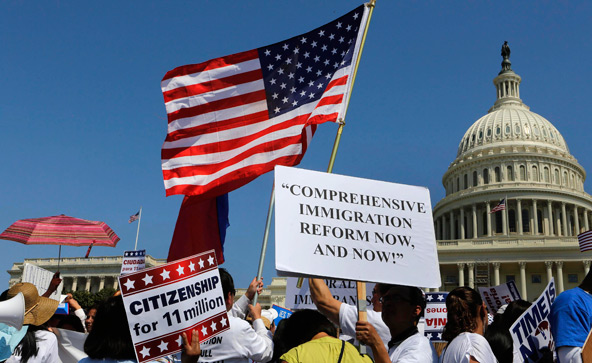
WASHINGTON (CNS) — Immigration legislation finally introduced in the Senate April 17 includes many of the provisions long-sought by advocates for comprehensive reform, but months of work likely lie ahead to attempt to turn it into law.
Among other provisions, it incorporates the popular DREAM Act, without an upper age limit; would offer a 13-year path to citizenship for undocumented immigrants who arrived before 2012; would expand the pool of visas for skilled and unskilled workers; dramatically changes the process for adult children or siblings of legal residents to immigrate; and would create a new set of “triggers” for determining that the border is “secure” before parts of the law may be implemented.
While advocates for immigrants were quick to applaud in general the effort by the senators who wrote the bill, the legislation drew criticism from all sides for its specifics, along with some early praise.
The Border Security, Economic Opportunity and Immigration Modernization Act of 2013, S. 744, weighed in at 844 pages and, after weeks of reports that it was “nearly finished,” was finally submitted by at 2 a.m. April 17 by Sen. Charles Schumer, D-N.Y.
Schumer is one of the so-called “gang of eight,” a bipartisan panel that has been working on crafting legislation that might win the support of both Republicans and Democrats.
Since Latino voter turnout proved to be key to Democrats doing well in the November elections, momentum has been strong in both parties to pass immigration reform. President Barack Obama laid out his principles for reform in January and has been working with stakeholders and political leaders to push for a bill that he said he would like to sign this summer.
Early praise to the senators for their efforts included a statement from Obama April 16, after a meeting with members of the drafting committee, saying that while the bill “is clearly a compromise and no one will get everything they wanted, including me,” it is, “largely consistent with the principles that I have repeatedly laid out for comprehensive reform.”
Obama said it includes common sense steps that the majority of Americans support, including a pathway to citizenship for the 11 million people who are in the country illegally, and that it would modernize the immigration system, help reunite families and attract skilled workers.
The U.S. Conference of Catholic Bishops, which has long lobbied for and organized Catholic backing for comprehensive reform, withheld specific comment until a news conference scheduled for April 22.
A statement from Archbishop Jose H. Gomez of Los Angeles, chairman of the USCCB Committee on Migration, said U.S. bishops “look forward to carefully examining the legislation and working with Congress to fashion a final bill that respects the basic human rights and dignity of newcomers.”
He commended the “gang of eight” for their leadership and courage. The statement went on to enumerate the oft-repeated goals of the bishops for immigration reform. They include: a path to citizenship; improvements in family-based immigration systems; restoration of due process for immigrants; a visa program for low-skilled workers and their families; policies that address the root causes of migration; and the protection of vulnerable populations.
Jeanne Atkinson, director of the Catholic Legal Immigration Network, known as CLINIC, said her organization of local immigration legal services agencies is gearing up to meet an anticipated huge need for legal assistance should the bill pass.
“The Senate proposed legislation will forever change the lives of 11 million undocumented immigrants who are already here, building communities and supporting families,” said Atkinson. “We need a permanent fix to the immigration system, including the ability to provide safe and trustworthy legal immigration services to those of all economic and social strata.”
Catholic Relief Services called attention to the struggles people face as they migrate and encouraged the Senate to address the economic and social factors that cause people to leave their home countries.
A statement from Bill O’Keefe, CRS’ vice president for advocacy and government relations, said the agency’s work in the world’s poorest communities gives it a perspective on why people migrate and “the humanitarian consequences of our broken immigration system.”
O’Keefe said that in 2009 alone, more than 18,000 would-be migrants were kidnapped on their journey north.
“Increasingly, youth in urban areas cite violence as one reason for their migration north,” he said. And small farmers find increased competition puts them out of work.
He said the immigration bill should encourage strategic intervention and partnerships in migrant-sending countries to address the reasons people leave.
In a statement from the umbrella organization Fair Immigration Reform Movement, spokesperson Kica Matos enumerated some of the problems the group sees with the bill. Among them, she said, are the need to expand the number of people who might be eligible for the path to citizenship.
“The cutoff date for eligibility and other unfair and unwise restrictions will leave hundreds of thousands families out of the process and create all the same moral and practical problems with which we began,” Matos said. “The 13-year length of the citizenship path is unjust as well as unwarranted and should be substantially shortened. All immigrant families deserve a chance to become a full part of the American dream in a reasonable period time.”
She said the group, which represents 30 community and national organizations, opposes all triggers for allowing the legalization process to start.
“Our families’ well-being should not be conditioned on arbitrary border measures or any political or bureaucratic process which holds their loved ones hostage to regulations over which they have no control,” Matos said.
As it stands, the bill damages family-based immigration, she said.
“We will not allow big corporations to dictate who deserves to come to this country,” said Matos’ statement. “To make it a zero-sum visa game between a scientist and a sister simply does not reflect the values of our country.”
— By Patricia Zapor, Catholic News Service





